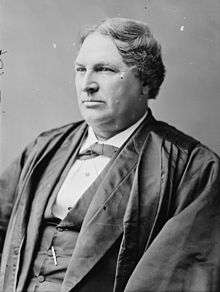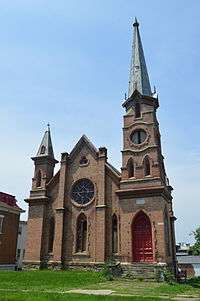Samuel Freeman Miller
| Samuel Miller | |
|---|---|
 | |
| Associate Justice of the Supreme Court of the United States | |
|
In office July 16, 1862 – October 13, 1890 | |
| Nominated by | Abraham Lincoln |
| Preceded by | Peter Daniel |
| Succeeded by | Henry Brown |
| Personal details | |
| Born |
April 5, 1816 Richmond, Kentucky, U.S. |
| Died |
October 13, 1890 (aged 74) Washington, D.C., U.S. |
| Political party |
Whig (Before 1854) Republican (1854–1890) |
| Alma mater | Transylvania University |
| Religion | Unitarianism |
Samuel Freeman Miller (April 5, 1816 – October 13, 1890) was an associate justice of the United States Supreme Court who served from 1862 to 1890. He was a physician and lawyer.
Early life and education
Born in Richmond, Kentucky, Miller was the son of yeoman farmers. He earned a medical degree in 1838 from Transylvania University in Lexington, Kentucky. While practicing medicine for a decade, he studied the law on his own and was admitted to the bar in 1847. Favoring the abolition of slavery, which was prevalent in Kentucky, he supported the Whigs in Kentucky.
Career

Miller moved to Keokuk, in Iowa, a state more amenable to his views on slavery. Active in Hawkeye politics, he supported Abraham Lincoln in the 1860 election. Lincoln nominated Miller to the Supreme Court on July 16, 1862, after the beginning of the American Civil War. His reputation was so high that Miller was confirmed half an hour after the Senate received notice of his nomination.
His opinions strongly favored Lincoln's positions, and he upheld his wartime suspension of habeas corpus and trials by military commission. After the war, his narrow reading of the Fourteenth Amendment—he wrote the opinion in the Slaughterhouse Cases—limited the effectiveness of the amendment. Miller wrote the majority opinion in Bradwell v. Illinois, which held that the right to practice law was not constitutionally protected under the Privileges or Immunities Clause of the Fourteenth Amendment.
He later joined the majority opinions in United States v. Cruikshank and the Civil Rights Cases, holding that the amendment did not give the U.S. government the power to stop private—as opposed to state-sponsored—discrimination against blacks. In Ex Parte Yarbrough, 110 U.S. 651 (1884), however, Miller held that the federal government had broad authority to act to protect black voters from violence by the Ku Klux Klan and other private groups. Miller also supported the use of broad federal power under the Commerce Clause to trump state regulations, as in Wabash v. Illinois.
Justice Miller wrote more opinions than any other Supreme Court Justice,[1] leading future Chief Justice William Rehnquist to describe him as "very likely the dominant figure" on the Court in his time.[2] When Chief Justice Salmon P. Chase died in 1873, attorneys and law journals across the country lobbied for Miller to be appointed to succeed him, but President Ulysses Grant was determined to appoint an outsider; he ultimately chose Morrison Waite.
After the 1876 presidential election between Rutherford Hayes and Samuel Tilden, Miller served on the electoral commission that awarded the disputed electoral votes to the Republican Hayes. In the 1880s, his name was floated as a Republican candidate for president.
Miller, a religious liberal, belonged to the Unitarian Church and served as President of the Unitarians' National Conference. Following his death, his funeral was held at Keokuk's First Unitarian Church;[3] Miller had been one of the congregation's founders.[4]
He died in Washington, D.C., while still a member of the court. He is buried at Oakland Cemetery in Keokuk, Iowa.
Noteworthy opinions
- The Slaughter-House Cases, 83 U.S. 36 (1873)
- Murdock v. Memphis, 87 U.S. 20 Wall. 590 590 (1874)
- United States v. Kagama, 118 U.S. 375 (1886)
- In re Burrus, 136 U.S. 586 (1890)
See also
References
- ↑ According to Michael Green's review of Ross' 2003 book (accessed 2014-Dec-09 from http://www.h-net.org/reviews/showrev.php?id=11521). Justice Miller wrote 616 opinions in his 28 years on the Court; Justice Field (whose 34 year SCOTUS tenure mostly overlapped Miller's) wrote 544 opinions; Chief Justice Marshall wrote 508 opinions in his 33 years on the Court.
- ↑ Rehnquist, William, Centennial Crisis: the Disputed Election of 1876, pg. 155
- ↑ Iutzi, Cindy. "Keokuk Church on Endangered List, Daily Gate City, 2014-04-25. Accessed 2015-08-06.
- ↑ Ross, Michael. [https://books.google.com/books?id=5v1hAQ0VkEMC Justice of Shattered Dreams: Samuel Freeman Miller and the Supreme Court During the Civil War Era\. Baton Rouge: Louisiana State University Press, 2003, 20.
Further reading
- Ross, Michael A.(1997), "Hill Country Doctor: The Early Life and Career of Supreme Court Justice Samuel F. Miller in Kentucky, 1816-1849," The Filson History Quarterly, Vol. 71 (October): 430–446.
- Ross, Michael A. (2003). Justice of Shattered Dreams: Samuel Freeman Miller and the Supreme Court during the Civil War Era. Baton Rouge: Louisiana State University Press. ISBN 0-8071-2924-0.
- ——— (1998). "Justice Miller's Reconstruction: The Slaughter-House Cases, Health Codes, and Civil Rights in New Orleans, 1861-1873". Journal of Southern History. 64 (4): 649–676. doi:10.2307/2587513.
| Legal offices | ||
|---|---|---|
| Preceded by Peter Daniel |
Associate Justice of the Supreme Court of the United States 1862–1890 |
Succeeded by Henry Brown |
| | |||||||||||||||||||||||||||||||||||||||||||||
|---|---|---|---|---|---|---|---|---|---|---|---|---|---|---|---|---|---|---|---|---|---|---|---|---|---|---|---|---|---|---|---|---|---|---|---|---|---|---|---|---|---|---|---|---|---|
|
 | ||||||||||||||||||||||||||||||||||||||||||||